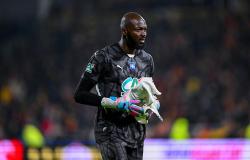The motivations of the man, a Syrian residing in Sweden, remain unknown, but he suffers from psychological problems according to German police.
A few days after the fatal car-ramming attack on the Magdeburg Christmas market, Germany was shaken by a news story this Tuesday, a few hours before New Year’s Eve. A man armed with a knife injured two people in western Berlin, in the Charlottenburg district, at midday, one of them seriously.
According to the German newspaper The mirror the suspect, a Syrian residing in Sweden, first attacked a man with a knife near a supermarket shortly before noon. He allegedly stole the knife from the store, a few moments before committing his first attack. Then he then allegedly attacked the second victim a stone’s throw from the business. As he began to self-harm, the suspect was allegedly overpowered by several passers-by.
The context surrounding this act remained unclear this Tuesday evening. According to the German police, cited by our colleagues, “Initial findings indicate that the suspect may show signs of mental illness”. An investigation into attempted murder has been opened. One of the two men attacked was able to leave the hospital at the end of the day.
The shadow of the Magdeburg attack
The German government, accused of failings after the deadly car-ramming attack on the Magdeburg Christmas market, said Monday that it could not have been avoided and highlighted the “pathological psyche” of the alleged Saudi perpetrator. The tragedy, which left five people dead and more than 200 injured on December 20, sent the country into turmoil.
For ten days, Germany has been wondering about the reasons which pushed this 50-year-old doctor who came to Germany in 2006 to mow down the crowds at the Christmas market aboard a powerful vehicle going at full speed.
On the political level, the attack placed the questions of immigration and security at the heart of the campaign for the early legislative elections on February 23. The suspect Taleb Jawad al-Abdulmohsen had refugee status and thus benefited from the protection of his host country.






